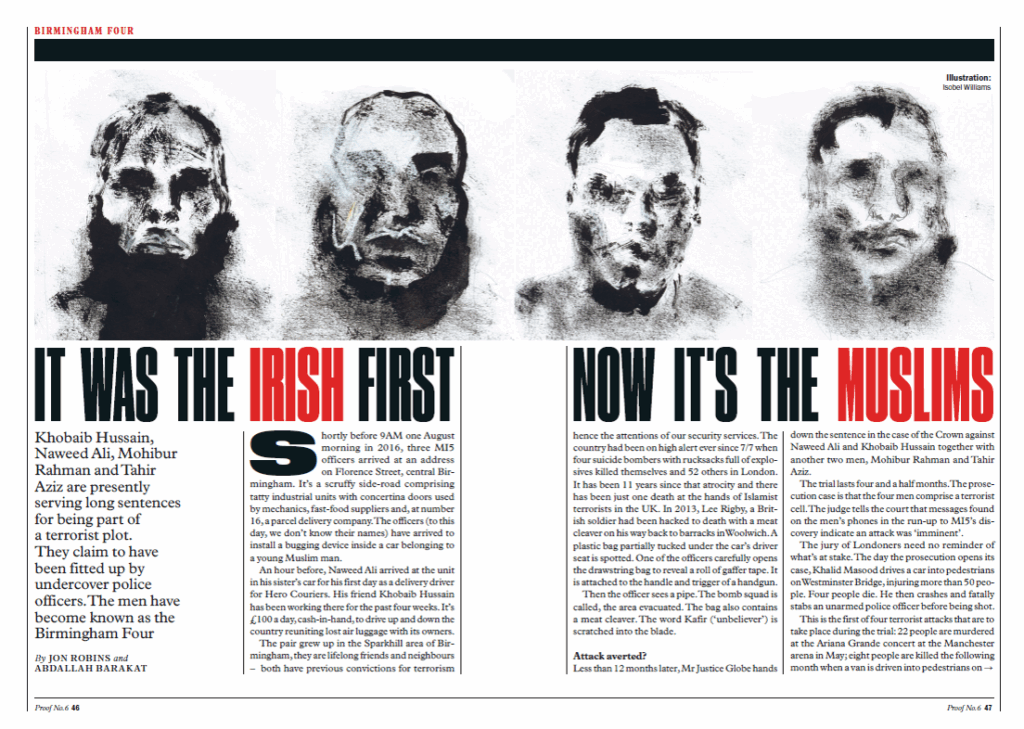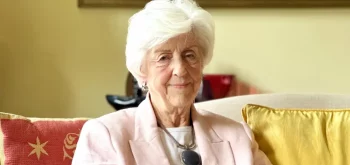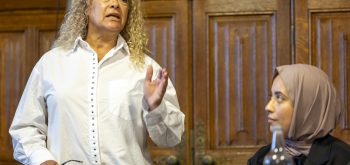Khobaib Hussain, Naweed Ali, Mohibur Rahman and Tahir Aziz are presently serving long sentences for being part of a terrorist plot. They claim to have been fitted up by undercover police officers. The men have become known as the Birmingham Four. From the latest issue of PROOF magazine. Illustration by Isobel Williams and photo by Andy Aitchison.
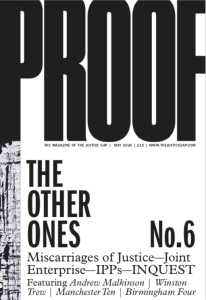 Shortly after 9am one August morning in 2016, three MI5 officers arrived at an address on Florence Street, central Birmingham. It’s a scruffy side-road comprising tatty industrial units with concertina doors used by mechanics, fast-food suppliers and, at number 16, a parcel delivery company. The officers (to this day, we don’t know their names) have arrived to install a bugging device inside a car belonging to a young Muslim man.
Shortly after 9am one August morning in 2016, three MI5 officers arrived at an address on Florence Street, central Birmingham. It’s a scruffy side-road comprising tatty industrial units with concertina doors used by mechanics, fast-food suppliers and, at number 16, a parcel delivery company. The officers (to this day, we don’t know their names) have arrived to install a bugging device inside a car belonging to a young Muslim man.
An hour before, Naweed Ali arrived at the unit in his sister’s car for his first day as a delivery driver for Hero Couriers. His friend Khobaib Hussain has been working there for the past four weeks. It’s £100 a day, cash-in-hand, to drive up and down the country reuniting lost air luggage with its owners.
The pair grew up in the Sparkhill area of Birmingham, they are lifelong friends and neighbours – both have previous convictions for terrorism, hence the attentions of our security services. The country had been on high alert ever since 7/7 when four suicide bombers with rucksacks full of explosives killed themselves and 52 others in London.
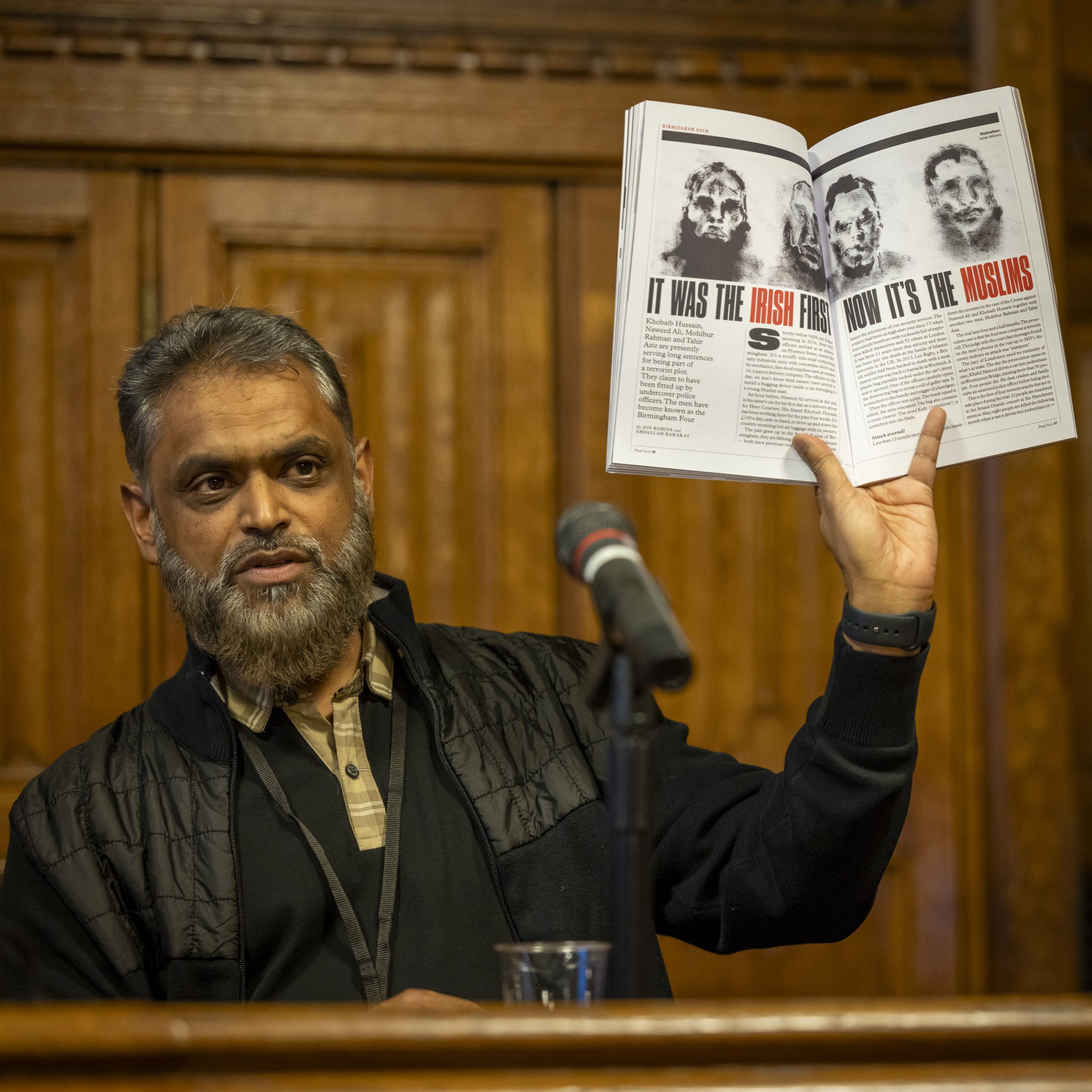
Moazzam Begg chaired a panel discussion on the Birmingham Four case. ‘It was like being a witness to a bizarre replay of history’. Photo: Andy Aitchison
It has been 11 years since that atrocity and there has been just one death at the hands of Islamist terrorists in the UK. In 2013, Lee Rigby, a British soldier had been hacked to death with a meat cleaver on his way back to barracks in Woolwich.
A plastic bag partially tucked under the car’s driver seat is spotted. One of the officers carefully opens the drawstring bag to reveal a roll of gaffer tape. It is attached to the handle and trigger of a handgun. Then the officer sees a pipe. The bomb squad is called, the area evacuated. The bag also contains a meat cleaver. The word Kafir (‘unbeliever’) is scratched into the blade.
Attack averted?
Less than 12 months later, Mr Justice Globe hands down the sentence in the case of the Crown against Naweed Ali and Khobaib Hussain together with another two men, Mohibur Rahman and Tahir Aziz. The trial lasts four and a half months. The prosecution case is that the four men comprise a terrorist cell. The judge tells the court that messages found on the men’s phones in the run-up to MI5’s discovery indicate an attack was ‘imminent’.
The jury of Londoners need no reminder of what’s at stake. The day the prosecution opens its case, Khalid Masood drives a car into pedestrians on Westminster Bridge, injuring more than 50 people. Four people die. He then crashes and fatally stabs an unarmed police officer before being shot. This is the first of four terrorist attacks that are to take place during the trial: 22 people are murdered at the Ariana Grande concert at the Manchester arena in May; eight people are killed the following month when a van is driven into pedestrians on London Bridge, its occupants later run to Borough Market and begin stabbing people before being shot dead by the police; and later that month a (white) man drives his van into a crowd of Muslims outside Finsbury Park mosque killing one and harming nine.
‘The events of Manchester and London Bridge demonstrate the terror and irreparable serious damage to life that can result from the use of explosives and bladed weapons,’ Mr Justice Globe tells the court. Another attack by a cell of four home grown jihadists has been averted, so the jury is told. He passes life sentences on all defendants with minimum terms of 20 years for three and 15 years for Aziz.
Stuck in a timewarp
It has now been seven years since the four men were convicted. Khobaib Hussain, Naweed Ali, Mohibur Rahman and Tahir Aziz are serving time at Long Lartin (Hussain), Frankland (Ali and Rahman) and Whitemoor (Aziz). One day in November last year, the men’s families and lawyers arrive at the House of Lords for an event organised by the Future of Justice Project and hosted by Labour peer Lord Tony Woodley. A screening of a short documentary has been arranged for parliamentarians presented by the former Guantanamo Bay detainee Moazzam Begg. The families are joined by their legal team, the veteran human rights lawyer Gareth Peirce and formidable defence barrister Stephen Kamlish KC. Both are convinced the men were wrongly convicted and that the case is a uniquely appalling miscarriage of justice.
The day after the jury’s verdict, Peirce did something that she had never done before. She published a public statement: ‘We register our unqualified respect for the system we have of trial by jury in this country. But jurors can on occasion get things wrong.’ The lawyer says that the circumstances leading to their conviction felt to her ‘like being in a timewarp’. ‘There were cases in the 1970s and the early 1980s where West Midlands Police planted and fabricated evidence to such an extent that the squad responsible was completely disbanded and dozens of defendants convicted, one by one had their convictions quashed,’ wrote the solicitor. ‘This case rests on police fabrication and mendacity in the clearest way.’
The new documentary is called The Birmingham Four: A grave miscarriage of justice and was made by the campaign group CAGE. The title is a nod to Peirce’s most notorious case: the six innocent Irishmen who spent 16 years in prison for the 1974 IRA bombing of two pubs which killed 21 people. It was the outrage at that appalling wrongful conviction that led to a royal commission and the establishment of the Criminal Cases Review Commission.
The fate of the four men now rests with the commission which is based in Birmingham in recognition of the failure of our justice system to right an obvious injustice. It is a 10 minute walk from Florence Street to the site of the two pubs blown up by the IRA via the CCRC’s head office. At the time of writing, an application on behalf of the men is expected to go to the CCRC.
A new suspect community
For over 20 years, Moazzam Begg claims to have been on ‘the receiving end of state harassment and violence’ despite never having been convicted. At the start of the documentary, he says has been ‘imprisoned and tortured’ in some of the most notorious prisons on Earth: ‘Pakistan, Bagram, Guantanamo, and Belmarsh’. Begg has been a client of Gareth Peirce for almost a quarter of a century. He recalls when they first met, the solicitor telling him: ‘It was the Irish first and now it’s the turn of the Muslims.’
Stephen Kamlish KC has called the verdict ‘utterly Islamophobic’ by a jury ‘who didn’t care that the whole of the evidence was bent’. ‘People were getting increasingly nervous and scared about being the next victim. Who’s going to let somebody let alone, a Muslim with a beard accused of terrorism – out at this time?’ he says. Three of the four men had previous terrorist convictions. Ali and Hussain travelled to Pakistan to attend a training camp but came back within two days when their families discovered where they were. Rahman spent time in prison accused of possession of a publication with terrorist content.
Aziz had no previous terrorism (or any) convictions and barely knew the three men. When he is picked up by West Midlands Police following the raid on the unit, the police discover a sword in the
back of his car. From the very start, Ali insists that the bag was planted. Gareth Peirce had travelled to the police station in Birmingham to advise Ali and Hussain during the initial interviews. If the bag was a ‘plant’, Peirce thinks, how and when was it planted?
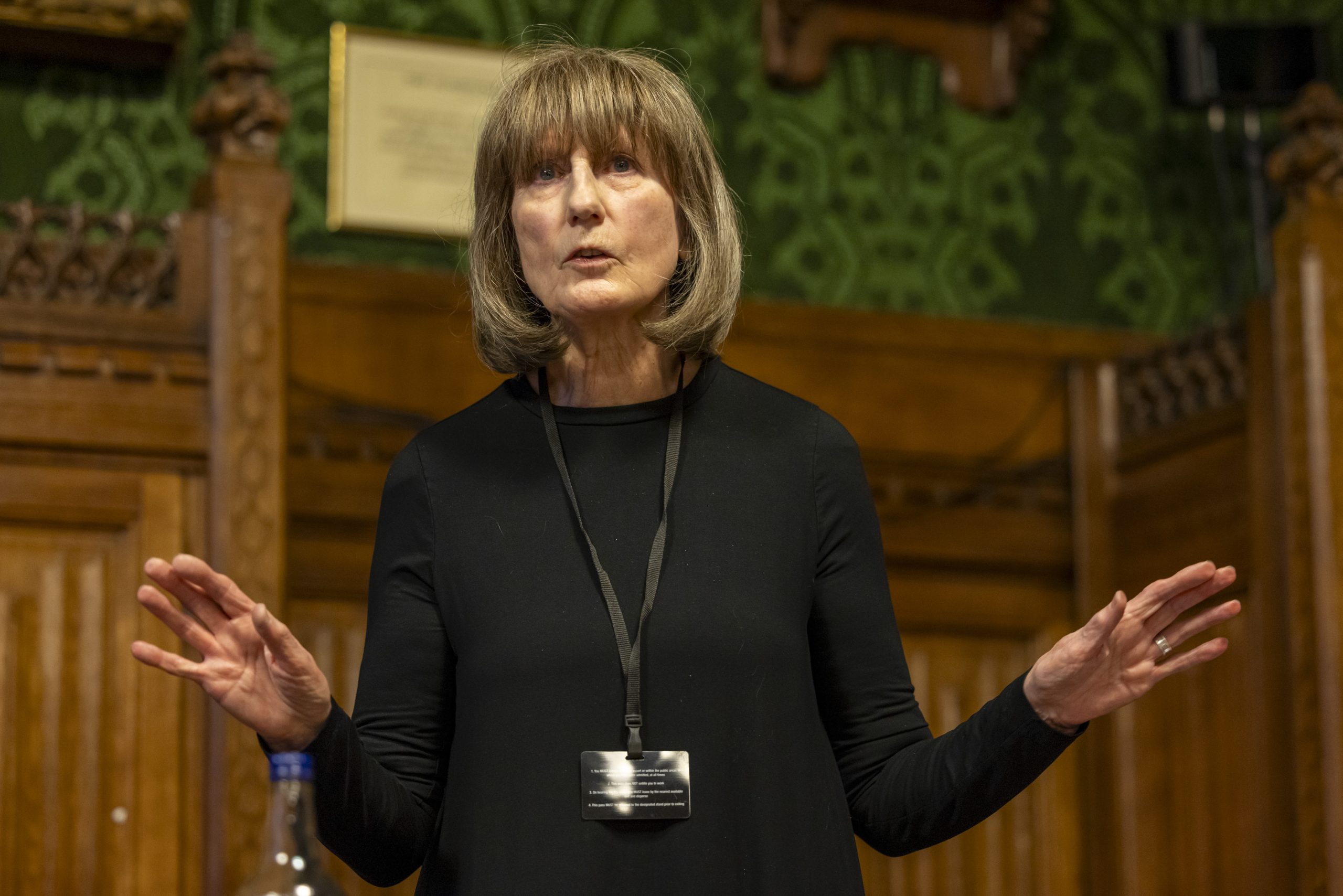
Gareth Pierce. Photo: Andy Aitchison
Weeks before the trial begins, the solicitor receives an email from the Crown Prosecution Service requesting a short extension to the deadline for serving evidence. When the evidence does arrive, there is a witness statement from the ‘proprietor’ of the courier company: ‘I am a serving law enforcement officer currently engaged in undercover operations. For the purposes of the covert operation I was deployed on, I was known as “Vincent”.’
When Ali arrived at the unit in his sister’s car, he was met by ‘Vincent’. There were double yellow lines outside and no parking available. He handed his car keys to ‘Vincent’ for him to park it inside the lock-up. The MI5 officers who came to bug Ali’s car (and then make the ‘discovery’ of the bag) were acting at the behest of a shadowy unit of West Midlands undercover officers.
Hero Couriers was a front for ‘Operation Pesage’ which had as its sole purpose the plan to lure in Khobaib Hussain. The hope was that he would then incriminate himself as he chatted to co-conspirators as he ran fabricated errands. It didn’t work. After four weeks, the net was widened to include Naweed Ali. It’s on his first day of ‘work’ at Hero couriers that MI5 arrive to arrange the surveillance of his car and make their shocking discovery.
The timing suggests that the Crown was prepared to let the trialproceed on the basis that ‘Hero Couriers’ was a legit business, and with the role of the undercover police entirely concealed. The extensive surveillance of all four men yielded no connection to a terrorist plot. There is no CCTV evidence footage and, until late in the trial, no forensics (see later).
Instead, days at trial are devoted to what is described to the jury as ‘mindset evidence’. The evidence of ‘longstanding radical violent ideology’, as Justice Globe explains, comes from their membership of extremist Telegram groups, messages relating to ‘Jihad’ and the quoting of Arabic songs known as ‘Nasheeds’. Moazzam Begg likens the way Nasheeds were cited in the trial as evidence of dangerous radicalism to the way prosecution lawyers increasingly use drill lyrics in rap songs as evidence of gang membership (see page 12). ‘It’s self-evidently ridiculous,’ Begg comments. ‘The songs were in Arabic – the men don’t speak the language. They literally didn’t know what they meant.’
Oscar-winning
‘Vincent’ was the key prosecution witness in the trial and gave evidence from behind a screen. He is subjected to what Mr Justice Globe describes as ‘a cross-examination onslaught’ by Stephen Kamlish. Gareth Peirce describes the barrister as ‘an intelligent, blunt instrument’. The Kamlish ‘onslaught’ tilts the balance of the trial. At one point, the barrister even convenes a meeting with the four defendants ahead of court business before the trial resumes. ‘You’re going home, lads,’ the barrister tells them. The prosecution had been forced to release a 38-page phone log of the texts between ‘Vincent’, his boss and other officers after the phones of the undercover team are seized by the police.
More than a thousand supposedly ‘deleted’ texts are recovered going back to Khobaib Hussain’s recruitment a month prior to the raid. The document appears to blow apart the credibility of their undercover operation. For example, ‘Vincent’ appears to anticipate the security service’s discovery of the plotters’ kit. Before the MI5 officers arrive at 9.50am on August 26 to make their discovery, ‘Vincent’ texts his boss: ‘They have just told me this is an intel-only search … BSS [British Security Service] will look and photograph anything but they can’t copy anything or forensically analyse anything!!!!!’
Three months into the trial, the prosecution appears to have a major breakthrough. They reveal forensic evidence linking Khobaib Hussain to the bag in Ali’s car. When the MI5 officer opens the drawstring JD Sports bag, he sees a magazine taped to the handle of a pistol. Hussain’s DNA has been discovered on the adhesive side of the tape. The court now learns that four weeks after the raid, ‘Vincent’ messages an undercover colleague: ‘It’s a sticky tape story – you were right.’ Kamlish speculates could the DNA have been obtained by pressing the adhesive side of the tape to the steering wheel of the car which Hussain had driven to work and which ‘Vincent’ had parked for him in the unit on eight separate occasions (in the same way he did with Ali’s)? Would that, he asks, explain why most of the DNA belonged to Hussain’s sister. After all, it was her car.
Peirce and Kamlish argue that ‘Vincent’ rewrote his notebooks and, in so doing, listed entries in the wrong date order so events appeared before they had happened. The text messages reveal that a week after the arrests the undercover officers are being chased up about writing up their statements. Vincent’s boss texts him: ‘We have agreed with cookie [a senior officer] that you will write your pocketbook for Pesage, not type, hope that helps.’
The issue of fabricated notebooks was a feature of the Irish cases. ‘The whole system’s computerised, everyone was meant to put in a report on the day,’ says Peirce. According to the lawyer, Vincent had to ‘make up an entire month’s notes’ to try and get a specifically coloured bag mentioned into his notebook in an attempt to match the bag discovered in the car. She points out that even then the bag retrospectively added to the notes is not the bag that her client is recorded on CCTV as having.
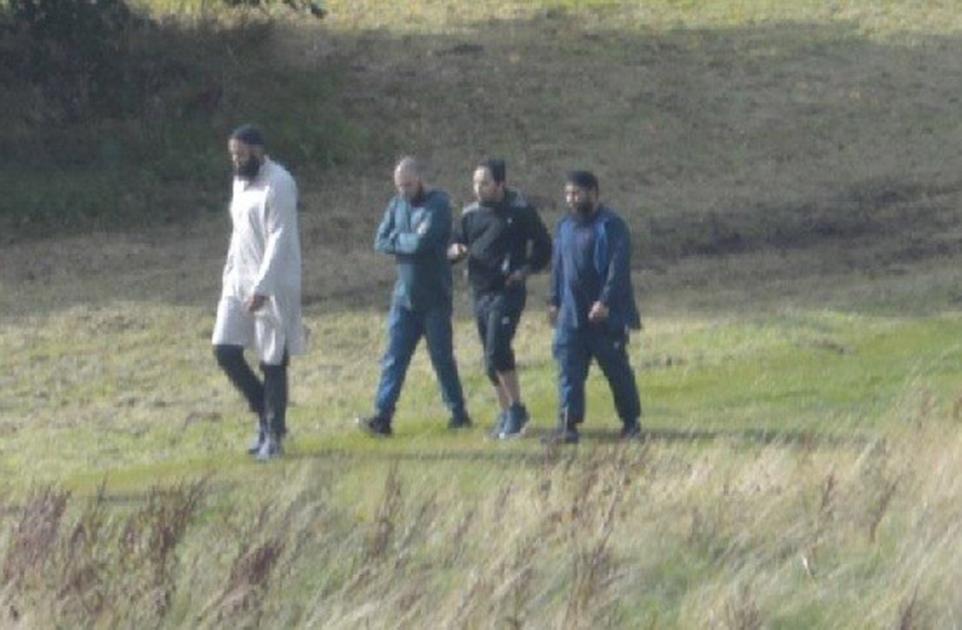
Under surveillance
‘Vincent’ jokes with one of three undercover colleagues who work on ‘Hero Couriers’, and who is about to retire. ‘Vincent’ has a farewell card for him. Vincent: ‘Hope it gives you a laugh.’ Colleague: ‘Not as much as reading your statement earlier!!! Joke joke joke… .’ Stephen Kamlish reads out the farewell text of ‘Vincent’ to his friend: ‘So you wanker … U leave me with a load of fucking wet wiped nob heads who don’t know how to put a job together wipe arses or cover tracks… Wanker… Miss you.’
The message trail reveals that the undercover officers had been in constant contact throughout the trial, as suspected, despite assurances to the court that they had not. This, the defence lawyers argue, is clear evidence of perjury. ‘Vincent’ and his boss meet in a car park just before the trial was due to start to discuss breaking into the Florence Street unit. Does ‘Vincent’ have an angle grinder, his boss asks. No need, he replies, he has ‘bolt croppers’.
Just ahead of giving evidence, he texts his boss: ‘I’m even more determined to put in an Oscar performance when I get in that box… I know [colleagues] think I’m an old school dinosaur but I don’t give a fuck what they think… they have never seen me give evidence… . I won’t let you down… . I would die first . See you Monday . :)’. His boss replies that he will not let him down either ‘even if it has been 25 years xxx [thumbs up emoji]. ‘Vincent’ says: ‘LOL… We are getting older… but not too old to twirl them and put them away for a long time [winking face emoji].’
‘They just didn’t care’
Over the course of the four month trial, Stephen Kamlish believes that he had exposed that the men were convicted on the basis of a plant by corrupt police officers. The barrister says that the case stands out in more than 40 years at the Bar. ‘Any open-minded observer knowing the evidence would have realised that this case was a fit-up organised by a small number of police officers.’
Gareth Peirce agrees. ‘If you had been representing someone wrongly convicted, and you came upon this evidence years later, it would be the key to the door,’ she said. ‘This would be evidence you couldn’t ever have dreamed of – clear police complicity. We couldn’t believe the jury could believe the prosecution case.’
At a public screening of the documentary on the same day of the House of Lords visit, the solicitor Matt Foot, who at the time worked with Peirce, recalled representing Hussain and Ali when they were arrested. ‘In 25 years of doing police station work, that was the scariest police station I’ve seen,’ he said. ‘It was absolutely clear to me that they were innocent. It was also clear to me that the police officers couldn’t answer the most basic questions because they weren’t in control of who had the information. It was terrifying. It was like being in a separate universe.’
He recalled attempting to visit ‘Heroes Couriers’ in the immediate aftermath of their arrest. ‘It wasn’t there anymore. There was nothing there,’ he recalled. ‘It felt like you were going mad in a system that wasn’t telling you the truth.’
‘It’s too much’
Mariam, Khobaib Hussain’s sister, says that her brother immediately regretted his trip to Pakistan with his old friend. ‘He’s my only brother,’ she says. ‘He was influenced by the Internet or other people, it’s shocking but he didn’t actually commit an offence at the time. They came back on the first flight home.’ Naweed Ali’s sister Shakila recalls ringing her brother in Pakistan. ‘It was bizarre but, thankfully, I got to get hold of him and told him: “Whoever is asking you to do this is wrong. You need to get home.” They were so happy to get home.’ Hussain recalled the call. ‘My mum told me to come back and not to do anything stupid,’ he said.
The pair were sentenced to 40 months in prison after guilty pleas for their part in the fiasco – they had already spent almost two years in jail. The judge, Mr Justice Henriques, acknowledged the pair ‘took the decision not to proceed with terror training and… realised what a shocking mistake you had made’. It was, Henriques said, ‘a chilling thought that unbeknown to your parents you left this country intending to undergo a period of terror training’. The ringleader, Irfan Nasser, was sentenced to life with a minimum of 18 years.
Mariam Hussain recalled her brother coming out of prison in 2015, only to be ‘recruited’ by Hero Couriers the following year. ‘We had raids on our home and racist officers to deal with,’ she said. ‘It destroyed our family’s future. Now it’s six years on, and he’s in prison. He’s hit 30 – this has been going on since he was 18 years. It’s a constant journey and a struggle that we are continuing to fight.’
Nazreen, Tahir Aziz’s sister, explained to parliamentarians at the Westminster meeting how her brother didn’t know the others. He met Hussain and Ali once and only knew Rahman because he offered him a lift when Rahman’s car had broken down. ‘My dad was so grieved by what happened to Tahir, he was hurting inside. He died in 2018.
It’s just my mum now and she’s always worried about him. If someone has committed a crime, you can understand the consequences; but if you haven’t committed anything and you’re punished for something that you’ve never done, it impacts everybody’s lives.’ ‘My dad came here when he was only 15,’ Nazreen said. ‘He spent most of his life here, working and paying taxes. I was born in Pakistan, came with my mom and I grew up in this country. I’ve always worked. I used to have two different jobs from nine to five, and then six to 12. We’ve always been brought up the British way, always followed the law. Tahir worked hard, he also had two jobs, at Primark during the day and delivering take-aways in the evening. He had multi-faith friends and never expressed any hatred to any religion. It’s so unfair.’ She explains the sword Tahir Aziz had in the back of his car on his arrest was a ceremonial sword he had picked up from a sports shop to protect himself from racists he encountered delivering takeaways.
One in a thousand
The Criminal Cases Review Commission, the body set up 25 years ago as a result of the furore over the Birmingham Six, will be charged with looking into the alleged misdeeds of West Midlands police. ‘When the CCRC began, it was with very, very high hopes,’ recalls Gareth Peirce. ‘The first commissioners and the work they did, was confident and determined. Over the years, there’s been a shrinking of courage.’
Peirce is all too aware of the crisis enveloping the watchdog body. ‘In lots of ways, the Home Office, which had the role before, was better, that’s the irony,’ the solicitor says. ‘It was the Home Secretary’s decision to refer a case back and it was possible to badger, badger, badger them so that it was more embarrassing not to refer a case. But the CCRC is an institution. It doesn’t have that vulnerability.’
The CCRC can only refer cases back when there is a ‘real possibility’ that the Appeal judges will overturn the conviction and that means new evidence or arguments have to be identified. That the Birmingham Four were, in the view of their lawyers, conclusively exposed as a self-evident victims of a miscarriage of justice during the trial doesn’t help in an appeals system which treats the jury as infallible.
‘It’s been seven years and we’re still knocking on doors looking for new evidence,’ complained Khobaib Hussain’s father in the House of Lords. ‘The evidence is already there. How the hell are you going to produce new evidence if you’re not allowed to investigate the officers because of that anonymity. The families are suffering. They haven’t committed a crime’.
West Midlands Police were asked to respond to the claims made above. They pointed out the investigation was by West Midlands Counter Terrorism Unit. In a statement, they said that in 2017 all four men were unanimously found guilty by a jury and the following year Mr Justice Openshaw rejected their leave to appeal saying there was ‘abundant evidence’ of Ali’s ‘extreme Jihadist beliefs, to the effect that it was his duty to attack those whom he considered to be ‘unbelievers’ in this country’.
The statement flagged the judgement of Lord Justice Holroyde in the Court of Appeal in 2018: ‘We have considered whether anything put before us casts doubt on the safety of the convictions. We are satisfied that there is nothing that does so. The jury by their verdicts plainly rejected that the evidence had been planted. Having done so there was ample circumstantial evidence against each of the accused to support the convictions.’
